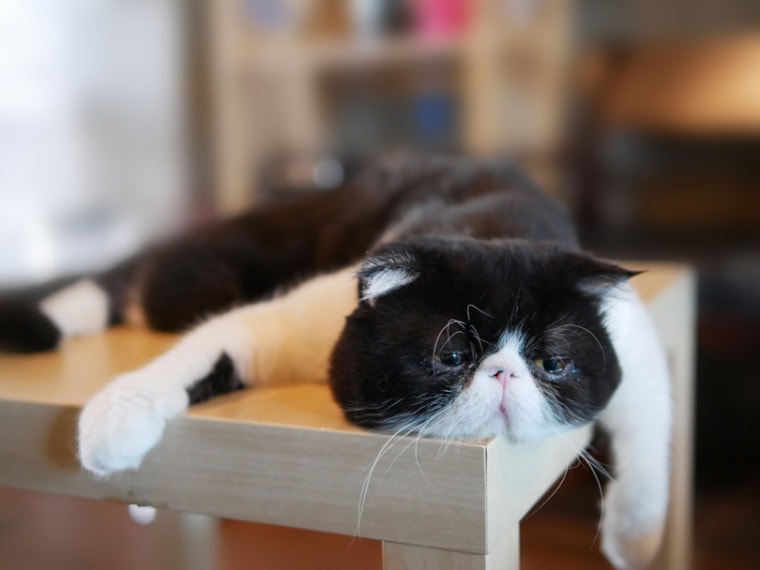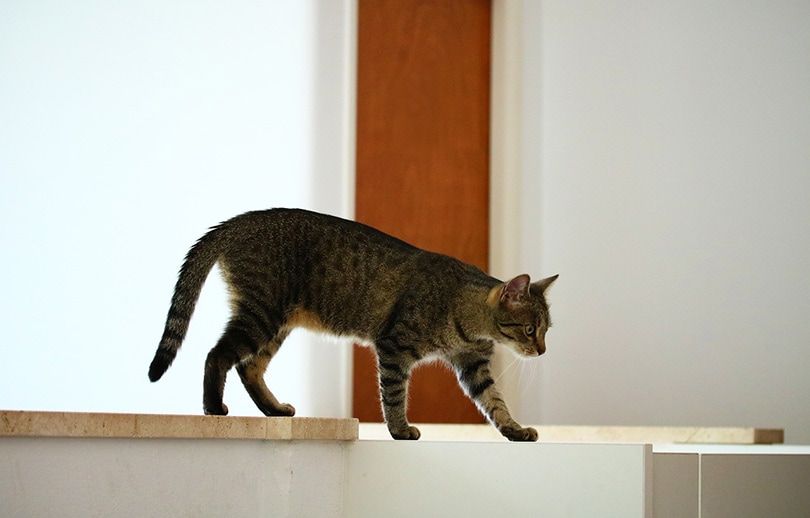
Can cats grieve and mourn the loss of a beloved companion? Most feline behavior experts say yes, cats can and do grieve.
While there are famous examples of grief in animals like elephants, whales, and chimpanzees, cats also can experience grief just as intensely.
In this article, we’ll look at what grief looks like in cats and other animals, and how you can help your cat process the loss of a close companion.
What is Animal Grief?
Grief is a complex response to the loss of someone with whom we have formed a close bond. Animals can mourn loss just like humans.
Grief is what’s known as a primary emotion. Primary emotions are basic feelings like fear, anger, happiness, and sadness. Grief falls into the larger sadness category.
In animals, like in humans, grief can take many forms.
Common mourning behaviors in animals include standing guard over a body, refusing to eat, and vocalizations like human crying.

How Can You Tell if a Cat is Grieving?
What does grief look like in cats? Cats are most likely to grieve the loss of a fellow companion cat.
Feline behavior experts outline different stages of cat grief. First, the remaining cat will vocalize, pace, and search. They seem to be actively looking for their lost friend.
In the second stage, cats (especially sensitive ones) will be withdrawn and less active. Some may experience a loss of appetite.
The last stage, like in humans, is acceptance. Cats will show acceptance in different ways. Some may become more attached to you; others may become more friendly and outgoing.
The ASPCA’s Companion Animal Mourning Project, which studied grief in pets, found that after a companion’s death, 70% of cats changed their vocalization habits, 46% ate less than usual, and many slept more and changed their sleeping places.
Researchers have also suggested that a grieving cat can have higher levels of stress hormones, which may lead to excessive grooming and litterbox problems.
Of course, all cats are individuals, so one cat’s grief may look different than another’s. In multi-cat households, one cat may be dominant and another submissive.
Once the dominant cat is gone, the remaining submissive cat might feel happier, calmer, and more confident than before.

How to Help a Grieving Cat
Let’s look at how you can help your cat through the grieving process, starting with one of the most common questions: should you get a new kitten for your remaining cat?
Is Getting a Kitten a Good Idea?
Most feline behavior experts suggest holding off on getting a new kitten right away. It’s a good idea to let your cat have time to process the loss before deciding.
Some cats will miss having a companion while some will be happier alone, especially if they were previously bullied. Your remaining cat’s age can also be a factor. Older cats might not enjoy having a new rambunctious kitten in the home.
It’s better for you and your cat if you resist the urge to get a kitten immediately and let your cat go through a period of grief and adjustment on its terms.
What else can you do to help your cat?

Helping Your Cat Grieve
In the early stages, a cat that deeply mourns the loss of a companion may meow and pace around the house a lot more than usual. This is normal and generally lasts a short time, but it can be distressing for owners to watch.
You can comfort your cat with a little extra affection, like hugs, pets, or brushing. You can also try distracting your cat with play. Experts generally don’t recommend consoling your cat with food or treats, as this may reinforce the unwanted behaviors.
If your cat is exhibiting searching behavior, it’s especially important to keep it inside because you don’t want your cat to wander or get lost. Some cats may withdraw, while some may be extra clingy during the grieving process. What can you do to help? A withdrawn cat can benefit from environmental enrichment. Environmental enrichment includes things like new toys or a new cat tree and even special occasion treats like tuna.
Environmental enrichment can also benefit a cat that becomes overly clingy, as this can help take the attention off you and direct it towards playing and other distractions. Of course, there’s nothing wrong with showing your grieving cat more affection and attention. This can include extra pets and cuddles if your cat is willing.
Even talking to your cat more or just sitting quietly together can be helpful for a cat mourning the loss of a close companion.
Should I Let My Cat See My Other Dead Cat?
Some cat owners wonder if they should let their cats see the other cat’s body to help them grieve. Is this a good idea?
Your cat may have been aware that the other cat was sick or in pain. Some cats will show signs of this, others won’t. The jury is out on whether a cat understands death in a way that makes showing a body meaningful.
There’s no real evidence that seeing the other cat after it has died will help in the grieving process. It may help, but it’s also likely that cats will not understand what they’re seeing. Keep in mind that it may be upsetting to you if your cat reacts negatively to the sight or smell of the deceased cat.
Can Cats Feel Your Sadness?
We’ve seen that there’s plenty of evidence that cats can grieve the loss of their companions. But of course, you’ll be grieving the loss of the other pet too. Will your cat be able to sense the grief that you are feeling?
Most cat owners will tell you that yes, their cats can tell when they are sad. Scientific research suggests that cats can sense and respond to human emotions, especially primary emotions like happiness and sadness.
Cats pick up on cues like human facial expressions and tone of voice. They can become stressed by our negative emotions like sadness and anger, while our positive emotions like happiness cause less stress.
The death of a beloved family pet is a difficult time for all the people and pets in the household. Chances are, you will recognize your cat’s grief and your cat will sense yours. With time and patience, you and your cat can go through the grieving process together and strengthen your bond with each other.
Featured Image Credit: 9lnw, Shutterstock







